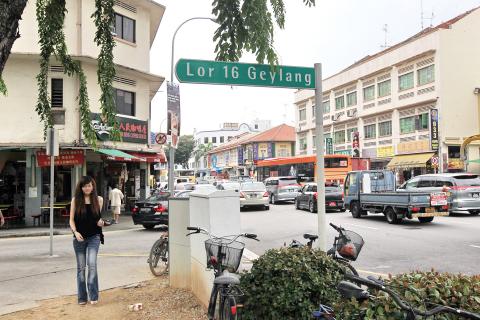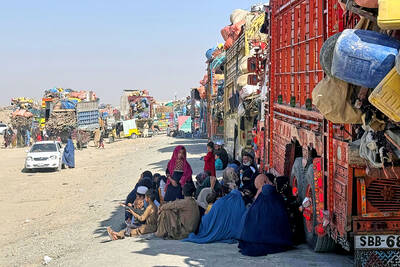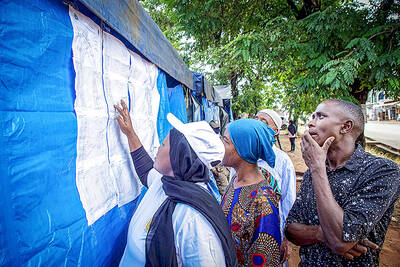Standing outside a harmless-looking two-story terrace house, a middle-aged man with a balding pate and wispy white goatee greets people walking by with a constant refrain.
“You want to see my girl? Come in, come in!” he exhorts every man in sight, pointing to skimpily clad Asian prostitutes waiting in a softly-lit sitting room along a back street in Geylang, Singapore’s red-light district.
The tout says more than 50 customers patronize his business daily.

Photo: AFP
“Our customers are international, anybody can come as long as they can pay,” he says, brushing aside a reporter’s suggestion that the police might not approve of his operation.
“We’re legal!” he scoffs loudly.
Despite its prudish reputation — the government still bans magazines like Playboy and Penthouse — Singapore allows prostitution to thrive in strictly designated areas, and Geylang is the largest and most famous.
Brothels operating out of houses operate in the district alongside budget hotels, sidewalk cafes, community associations and even Buddhist temples.
Despite the presence of legal prostitution, foreign women on short-term visitor passes also ply their trade on the streets and lanes of Geylang, and there seems to be enough business for everyone.
More than a fifth of the city-state’s population of 5 million are foreigners, the majority of them blue-collar and manual workers.
And 1 million tourists a month now visit Singapore thanks to a booming casino industry.
The local sex trade came under the spotlight in June last year when the US Department of State downgraded Singapore in its Trafficking in Persons Report.
The report said some women from China, the Philippines and Thailand were tricked into coming to Singapore with promises of legitimate employment and then coerced into the sex trade after arrival.
Singapore authorities issued an indignant reply, saying their efforts to curb trafficking had not slackened and asked the US government to look at its own immigration record before commenting on other countries’ situations.
In Geylang’s licensed brothels, customers pay an average of S$50 (US$38) for sex inside cramped cubicles, according to operators who spoke on condition of anonymity.
Their primary customers are guest workers from China, Bangladesh and Southeast Asia.
Business is best on weekends when hordes of foreign men on their day off throng its narrow lanes looking for fun.
Like other businesses in Singapore, the sex trade has clear rules.
Brothels can only hire Malaysian, Thai and Chinese girls between the ages of 21 and 27, one tout said.
Prostitutes are also required to make customers wear condoms and report for monthly medical check-ups, he added.
Streetwalker Dan Dan (not her real name) from Beijing said an increased presence of plainclothes police was deterring customers from taking up her US$100 “guaranteed good” service.
Foreign women like Dan Dan who work freelance in the sex trade and bring customers to motel rooms cannot be arrested unless they are caught offering their services out in the street, or violate immigration and other laws.
Local women’s rights activist Braema Mathi advocates protection of prostitutes in Singapore and closer regulation of the industry.
“All we want is for the women to be protected and not judge them for the work that they have decided to take on,” she said.
“We believe that one of the better ways to protect women is to ensure that they work in licensed brothels, where there is a fee structure and condoms,” she said.
With a regulated sex industry, Singapore authorities can turn their attention to women forced into prostitution, she said.

With much pomp and circumstance, Cairo is today to inaugurate the long-awaited Grand Egyptian Museum (GEM), widely presented as the crowning jewel on authorities’ efforts to overhaul the country’s vital tourism industry. With a panoramic view of the Giza pyramids plateau, the museum houses thousands of artifacts spanning more than 5,000 years of Egyptian antiquity at a whopping cost of more than US$1 billion. More than two decades in the making, the ultra-modern museum anticipates 5 million visitors annually, with never-before-seen relics on display. In the run-up to the grand opening, Egyptian media and official statements have hailed the “historic moment,” describing the

‘CHILD PORNOGRAPHY’: The doll on Shein’s Web site measure about 80cm in height, and it was holding a teddy bear in a photo published by a daily newspaper France’s anti-fraud unit on Saturday said it had reported Asian e-commerce giant Shein (希音) for selling what it described as “sex dolls with a childlike appearance.” The French Directorate General for Competition, Consumer Affairs and Fraud Control (DGCCRF) said in a statement that the “description and categorization” of the items on Shein’s Web site “make it difficult to doubt the child pornography nature of the content.” Shortly after the statement, Shein announced that the dolls in question had been withdrawn from its platform and that it had launched an internal inquiry. On its Web site, Le Parisien daily published a

‘NO WORKABLE SOLUTION’: An official said Pakistan engaged in the spirit of peace, but Kabul continued its ‘unabated support to terrorists opposed to Pakistan’ Pakistan yesterday said that negotiations for a lasting truce with Afghanistan had “failed to bring about a workable solution,” warning that it would take steps to protect its people. Pakistan and Afghanistan have been holding negotiations in Istanbul, Turkey, aimed at securing peace after the South Asian neighbors’ deadliest border clashes in years. The violence, which killed more than 70 people and wounded hundreds, erupted following explosions in Kabul on Oct. 9 that the Taliban authorities blamed on Pakistan. “Regrettably, the Afghan side gave no assurances, kept deviating from the core issue and resorted to blame game, deflection and ruses,” Pakistani Minister of

UNCERTAIN TOLLS: Images on social media showed small protests that escalated, with reports of police shooting live rounds as polling stations were targeted Tanzania yesterday was on lockdown with a communications blackout, a day after elections turned into violent chaos with unconfirmed reports of many dead. Tanzanian President Samia Suluhu Hassan had sought to solidify her position and silence criticism within her party in the virtually uncontested polls, with the main challengers either jailed or disqualified. In the run-up, rights groups condemned a “wave of terror” in the east African nation, which has seen a string of high-profile abductions that ramped up in the final days. A heavy security presence on Wednesday failed to deter hundreds protesting in economic hub Dar es Salaam and elsewhere, some